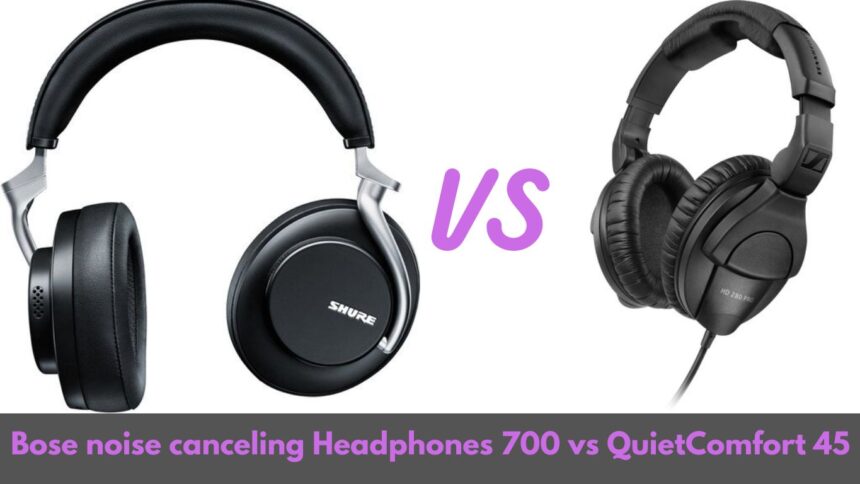Attention audiophiles and music enthusiasts!
Are you looking for the perfect pair of headphones that will deliver nothing but crystal-clear, immersive sound?
Look no further because today we’re going to compare two of the biggest names in the audio world: Shure vs Sennheiser.
Whether you’re a professional recording artist or simply an avid listener, choosing between these two headphone giants can be quite overwhelming.
But fear not, as we dive into their features, performance, and overall value-for-money proposition to help you make an informed decision.
Get ready to discover which brand reigns supreme in this ultimate showdown it’s time to put your listening skills to the test!
| Specification | Shure Headphones | Sennheiser Headphones |
|---|---|---|
| Brand History | Shure Incorporated was founded in 1925 by Sidney N. Shure | Sennheiser Electronic GmbH & Co. KG was founded in 1945 |
| Target Audience | Professional musicians and audiophiles | Audiophiles, casual listeners, and gamers |
| Design | Over-ear, in-ear, and on-ear headphones with a durable design | Over-ear, in-ear, and on-ear headphones with a sleek design |
| Sound Quality | Balanced and accurate sound signature | Rich and warm sound signature with emphasis on mid-range tones |
| Connectivity | Wired connections only | Wired and wireless connections are available |
| Voice Assistant | N/A | Support for Google Assistant and Amazon Alexa |
| Battery Life | N/A | Up to 30 hours of wireless playback time for some models |
| Comfort | Comfortable and durable, designed for extended wear | Comfortable and ergonomic, with adjustable fit for all-day use |
| Compatibility | Compatible with most devices including Android and iOS | Compatible with most devices including Android and iOS |
| Special Features | Detachable cables, sound-isolating technology, and EQ controls | Active noise-cancellation, touch controls, and app integration |
| Warranty and Support | Limited two-year warranty and customer support | Two-year warranty and customer support included |
What are the differences between Shure and Sennheiser headphones?
Shure and Sennheiser are two of the most well-known headphone brands in the world.
They both produce high-quality headphones that are perfect for a variety of uses.
However, there are some important differences between these two brands.
Here are five key differences:
1. Sound quality: Shure generally produces higher-quality headphones than Sennheiser. This is likely due to the fact that Shure focuses more on audio accuracy while Sennheiser is more focused on sound quality.
However, there are exceptions to this rule, so it’s important to test out each brand’s headphones before making a final decision.
2. Comfort: Shure typically offers greater comfort than Sennheiser due to their wider ear cups and softer ear pads. These features also make them less likely to cause fatigue over extended periods of use.
3. Cable length: The cable length of Shure headphones tends to be shorter than those of Sennheiser. This may be a disadvantage for people who want longer cables for portable use or for when they want to use their headphones outdoors (where cables can get tangled).
4. Ergonomics: Both brands offer good ergonomics, but Shure’s ear cups tend to be slightly larger overall which may make them more comfortable for people with larger ears.
5. Price: Although both brands offer high-quality products, Shure usually costs less than Sennheiser does.
Sound Quality

There are many headphones on the market today, and it can be hard to decide which ones to buy.
One of the most important factors to consider when choosing headphones is sound quality.
Shure and Sennheiser are two of the most popular headphone brands on the market today. Both companies make high-quality products, but which one is better?
To answer this question, we first need to discuss what sound quality is. Sound quality refers to the clarity and accuracy of the reproduction of sound.
It affects how immersive an experience with music or audio can be.
Higher sound quality means that you will hear more details in the music and less noise interference.
Now that we have defined sound quality, we can compare Shure vs Sennheiser headphones.
When it comes to building quality, both companies make excellent products. They both have a solid feel and are well-made.
Shure’s earcups are slightly larger than Sennheiser’s, but both headsets are comfortable to wear for extended periods of time.
The cables on both headsets are also durable and tangle-free.
When it comes to sound quality, however, Shure wins hands down. Their products are more accurate and clear than those from Sennheiser.
They also produce less noise interference than their German rival, meaning you will hear all of the details in the music without being drowned out by other sounds.
Ultimately, if sound quality is your main concern
Special Features
With so many headphones on the market, it can be hard to decide which one is right for you.
To make things even more complicated, there are a number of different types of headphones, each with its own set of features and benefits.
Below, we’ll compare the two most popular types of headphones :
- Shure headphones
2. Sennheiser headphones
Size and Weight: The first major difference between Shure and Sennheiser headphones is their size and weight. Shure headphones are much smaller and lighter than Sennheiser headphones, making them easier to carry around.
Additionally, they typically have a shorter cord than Sennheiser headphones, which makes them less likely to get tangled up during use.
Sound Quality: Sound quality is another key difference between Shure and Sennheiser headphones. Shure has been known for producing high-quality audio for decades, while Sennheiser has become one of the most popular brands in the headphone industry due to its impressive sound quality capabilities.
Some people say that Shure’s audio is warmer than Sennheiser’s, while others find that both brands offer good sound quality overall.
Cord Length: The length of a headphone cord can also affect sound quality. Shure’s cords are typically shorter than those found on Sennheiser headsets, which may cause interference with other electronics if not.
Pros and Cons of Shure Headphone
Pros and Cons of Sennheiser headphones
Conclusion
When it comes to sound quality, there are a few headphone brands that stand out above the rest.
Shure and Sennheiser are two of these brands, and each has its own unique style that can be quite appealing to some people.
If you’re looking for an incredible audio experience then these headphones might be a good option for you, but make sure you decide which one suits your needs best before making a purchase.
FaQ’s
What is the best Sennheiser headset for gaming 2023?
The Sennheiser GSP 600 is widely recognized as one of the best gaming headsets for 2023 due to its exceptional sound quality and comfortable design. Its advanced noise-cancelling feature provides an immersive gaming experience.
What are the world’s best headphones?
The world’s best headphones can vary depending on individual preferences, needs, and budget. However, if we’re looking at a balanced blend of sound quality, comfort, and functionality, here are five contenders:
- Sony WH-1000XM4
- Bose Noise Cancelling Headphones 700.
- Sennheiser HD 660 S
- Beyerdynamic DT 1990 Pro.
- Apple AirPods Pro
Which headphone is best for ear health?
The best headphones for ear health would be those that offer good sound quality at lower volumes, have noise-cancellation features, and provide a comfortable fit. Some examples include the Sony WH-1000XM4, Bose Noise Cancelling Headphones 700, and the Apple AirPods Pro.
Are Sony headphones better than Sennheiser?
Sony and Sennheiser both produce high-quality headphones, but they excel in different areas. Sony tends to have superior noise-cancelling technology and is often preferred for casual listening. Sennheiser, on the other hand, is favored for its exceptional sound quality, making it a favorite among audio professionals.
Is Sennheiser high quality?
Yes, Sennheiser is renowned for its high-quality headphones. Their products are known for excellent sound fidelity, durability, and comfort, making them a popular choice among audio professionals and music enthusiasts alike.










